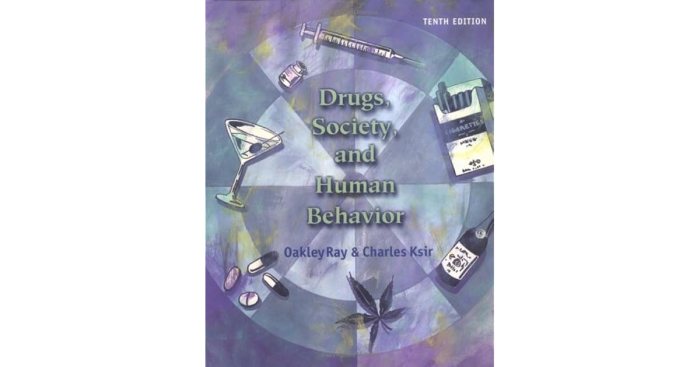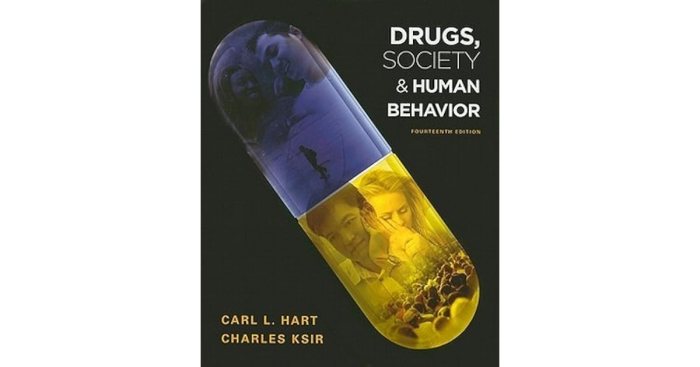Drugs society and human behavior 18th edition – Drugs, Society, and Human Behavior, 18th Edition, embarks on an engrossing journey into the intricate relationship between drugs, society, and human conduct. This comprehensive text delves into the historical, pharmacological, psychological, and societal dimensions of drug use, providing a multifaceted understanding of this complex phenomenon.
From the prevalence of drug use throughout history to the mechanisms of action of various drugs, the book explores the diverse aspects of drug use and its impact on individuals, families, and communities. It examines the neurobiological and psychological factors that contribute to addiction, as well as the ethical and social implications of drug policy.
1. History of Drug Use: Drugs Society And Human Behavior 18th Edition

Drug use has been prevalent throughout human history, with evidence of its use dating back to ancient civilizations. In ancient Egypt, opium was used as a pain reliever and sedative, while in China, cannabis was used for recreational and medicinal purposes.
Societal attitudes towards drug use have varied significantly over time. In some cultures, drug use was tolerated or even encouraged, while in others it was strictly prohibited. In the United States, for example, drug use was largely unregulated until the early 20th century, when a series of laws were passed that criminalized the possession and distribution of certain drugs.
The factors that have influenced drug use patterns over time are complex and include cultural, economic, and political factors. For example, the widespread use of opium in the 19th century was due in part to the availability of cheap opium from China and the lack of effective pain relievers.
Similarly, the rise of synthetic drugs in the 20th century was due in part to the development of new technologies and the desire for new and more potent drugs.
Types of Drugs and Their Effects, Drugs society and human behavior 18th edition
Drugs can be classified into different types based on their pharmacological properties. Some of the most common types of drugs include:
- Depressants: These drugs slow down the activity of the central nervous system, producing feelings of relaxation and sedation. Examples of depressants include alcohol, benzodiazepines, and opioids.
- Stimulants: These drugs speed up the activity of the central nervous system, producing feelings of alertness and energy. Examples of stimulants include caffeine, cocaine, and amphetamines.
- Hallucinogens: These drugs alter the way the brain perceives reality, producing hallucinations, delusions, and other changes in perception. Examples of hallucinogens include LSD, psilocybin, and mescaline.
The effects of drug use on the human body and behavior can vary depending on the type of drug, the dose, and the individual’s physiology and mental health. Short-term effects of drug use can include changes in mood, behavior, and perception.
Long-term effects of drug use can include addiction, organ damage, and mental health problems.
Drug Addiction and Dependence
Drug addiction is a chronic, relapsing brain disease that is characterized by compulsive drug seeking and use, despite negative consequences. Drug dependence is a milder form of addiction that is characterized by a physical and/or psychological need for a drug.
The neurobiological and psychological factors that contribute to addiction are complex and include changes in the brain’s reward system, as well as genetic, environmental, and social factors.
The consequences of drug addiction can be devastating for individuals, families, and society. Addiction can lead to job loss, homelessness, crime, and violence. It can also damage relationships, strain family finances, and increase the risk of mental health problems.
Drug Policy and Regulation
Drug policy refers to the laws and regulations that govern the production, distribution, and use of drugs. Different countries have different approaches to drug policy, ranging from prohibition to legalization.
The effectiveness of various drug control strategies is a matter of debate. Some studies have shown that prohibition can lead to increased drug use and related problems, while other studies have shown that legalization can lead to decreased drug use and related problems.
The ethical and social implications of drug policy are also complex. Some people argue that drug use should be a matter of personal choice, while others argue that drug use should be regulated in order to protect public health and safety.
Drug Prevention and Treatment
Drug prevention programs aim to reduce drug use and related problems by providing education and support to individuals, families, and communities.
Drug treatment programs aim to help people overcome drug addiction and dependence. There are a variety of different treatment approaches, including behavioral therapy, medication, and support groups.
The effectiveness of different treatment approaches varies depending on the individual and the type of drug addiction. However, research has shown that treatment can be effective in helping people overcome drug addiction and dependence.
Drugs and Mental Health
Drug use can have a significant impact on mental health. Some drugs, such as alcohol and marijuana, can be used to self-medicate mental health conditions, such as anxiety and depression. However, drug use can also worsen mental health conditions and lead to addiction.
The use of drugs to treat mental health conditions is a complex issue. Some drugs, such as antidepressants and antipsychotics, can be effective in treating mental health conditions. However, it is important to use these drugs under the supervision of a doctor and to weigh the risks and benefits of treatment.
Drugs and Society
Drug use can have a significant impact on society. Drug use can lead to crime, violence, and other social problems. It can also damage relationships, strain family finances, and increase the risk of mental health problems.
The social and economic consequences of drug use are complex and far-reaching. Drug use can cost society billions of dollars in lost productivity, healthcare costs, and crime-related costs.
The stigma and discrimination associated with drug use can also have a negative impact on society. People who use drugs are often marginalized and excluded from society, which can make it difficult for them to get help and support.
FAQ Insights
What are the major types of drugs?
Drugs are classified into various categories based on their pharmacological properties, including stimulants, depressants, hallucinogens, and opioids.
What are the risk factors for drug addiction?
Risk factors for drug addiction include genetic predisposition, environmental factors, and psychological vulnerabilities.
What are the consequences of drug addiction?
Drug addiction can lead to a range of negative consequences, including health problems, social isolation, and economic instability.
What are the different approaches to drug policy?
Drug policy approaches vary worldwide, ranging from prohibition to harm reduction and legalization.
What are the challenges of drug prevention and treatment?
Drug prevention and treatment face challenges such as stigma, lack of access to resources, and the complexity of addiction.
